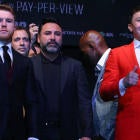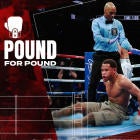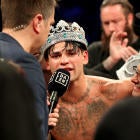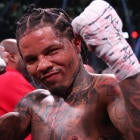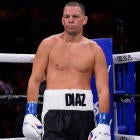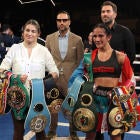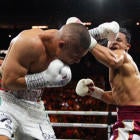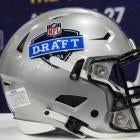You can mention the potential for fireworks. You can mention the prize at stake of the still glamorous middleweight championship of the world. You can even bring up how important the fight is to the careers of both participants.
Heck, you can even talk about the simple fact that its the antithesis of the Floyd Mayweather-Conor McGregor circus that the sports world (and beyond) was subjected to all summer.
But regardless of which element of the fight has you most excited entering Saturday's pay-per-view showdown in Las Vegas between unified titleholder Gennady Golovkin and lineal champion Canelo Alvarez (HBO PPV, 8 p.m. ET), there's a combination of compelling elements that make this fight feel unique to others in recent years.
Admittedly, this fight isn't exactly a lock to threaten the record for PPV buys. But it's a superfight just the same and may be more important than others in recent memory simply for the timeless message it presents: That it's essential for the best to fight the best, regardless of danger, in order to uphold the overall health of the sport.
Both Alvarez (49-1-1, 34 KOs) and Golden Boy Promotions may have delayed the bout 12-18 months longer than they should have, but they haven't missed the window of expiration in making the fight count. In fact, one can argue that the delay has only made it feel like a bigger event, allowing Alvarez's elite skill set at age 27 to catch up with his immense popularity.
Late into a decade which has featured alternate good and horrifically bad years in terms of big fights being made (and more importantly delivering), this is a fight that retains a very old school feel. In fact, it's difficult not to compare the anticipation to that of classic showdowns like Marvin Hagler-Thomas Hearns. And it comes at the tail end of a renaissance comeback year for boxing which has featured a rejuvenated heavyweight division and more quality matchups consistently being made than any year (outside of 2013) this decade.
Should Alvarez-Golovkin end up delivering what is promised in terms of action while stamping the winner as the confirmed face of the sport in the post Floyd Mayweather and Manny Pacquiao era, it isn't out of the question to suggest the fight could help launch a return to the days of old -- a time when big fights could not only command the attention of the general sporting public, but (most importantly) hold that attention firm by delivering upon the promise of the promotion for entertainment and building true momentum.
Not only are both fighters still within the city limits of their respective primes -- unlike Mayweather-Pacquiao or even Mayweather-Alvarez, which did big business but saw Canelo, at 23, still too green for center stage -- there's a real 50/50 feel on paper as to which fighter will win. There's also an element of career validation at play for both fighters, each of whom have yet to score the singular defining victory of their careers.
That's what brings us back to the timing of the fight. While no boxing fan in their right mind would support the idea of a promoter "marinating" a big fight in order to milk its long-term financial potential, Golovkin (37-0, 33 KOs) enters the bout fresh off his most humanizing victory to date in March when Daniel Jacobs became the first fighter to push him to the 12-round limit (snapping his 23-fight knockout streak).
One year ago, most would've predicted an eventual knockout for GGG. But Golovkin is now 35 and Alvarez has appeared to close the gap. In fact, more experts and current fighters than ever before believe Canelo might have the body attack and accurate counter shots to disarm the Kazakh slugger and win a decision.
Should the winner of the fight do so in a demonstrative and impressive way, the reward could be more than simply identification as the best middleweight -- in this case, the winner could find himself declared as the pound-for-pound best in the world. While the recent light heavyweight fights between Andre Ward and Sergey Kovalev held the same rare distinction in potentially offering the same prize, neither fight was as in demand as this one.
That's ultimately where it becomes difficult to find a fight in recent memory that's an exact match to what Alvarez-Golovkin ultimately offers. Nearly every big bout one can think of isn't a perfect fit in one form or another.
Some weren't as big of an event or featured big-name fighters who had previously been stopped or exposed physically in some form. Some, like Mayweather-Ricky Hatton, featured a large build but a fairly predictable outcome to most experts. Others, meanwhile, were more of a passing of the torch (think Mayweather-De La Hoya) than a showdown between two prime fighters looking to take that next level to legendary greatness.
While Mayweather's run atop the sport produced singular nights of big business, his dominance and advantageous matchmaking prevented a run of evenly matched fights where the prize at stake was equally as big to both participants. That's what makes Alvarez-Golovkin feel a lot more like similar to marquee fights like Felix Trinidad-De La Hoya and Pernell Whitaker-Julio Cesar Chavez than anything the subsequent two decades have been able to produce.
Forget any monikers like "the fight to save boxing." Die-hard fight fans have been there and done that many times before with that kind of hyperbole. But let's not underscore the importance of what Alvarez-Golovkin could mean to the future.
In a way, maybe the timing was perfect for a fight like Mayweather-McGregor -- Floyd's swan song and final money grab he just couldn't refuse -- to come so close to Alvarez-Golovkin. For as much as Mayweather has accomplished, the health of boxing desperately needs the era he dominated to come to an end.
Maybe if we're lucky, Saturday's fight will produce a clean handoff.












